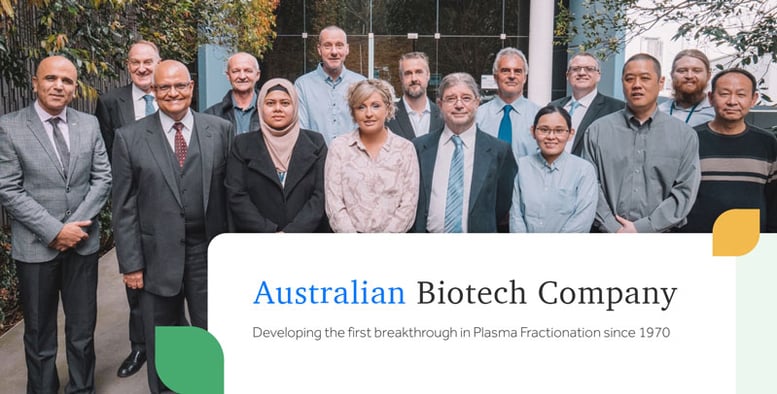Barclay Pearce Capital
- Jan 28, 2021
- 16 min read
Aegros' Hyperimmune solution in the world of Vaccines for COVID-19
The interview with Aegros gave us in-depth understanding of the hyperimmune solution they are working on and their thoughts on COVID-19 vaccines. Communications Strategist Sally A Illingworth is joined by Managing Director, John Manusu and Executive Chairman, Dr.Hari Nair in an interview at the Aegros facility in Sydney.
We are pleased to see the recent announcements suggesting several vaccines maybe available, hopefully, from March 2021. Hyperimmunes and vaccines work hand-in-glove. We require both of these treatment modalities to protect society from the ravages of a virus like COVID-19. The more prevention and treatment options available to address this pandemic, the stronger position our society will hold. Firstly, some definitions:
Hyperimmunes
Hyperimmunes transfer the antibodies from someone who has developed immunity to an infection into a recipient who does not have that immunity. Hyperimmunes provide the recipient with immediate protection. Hyperimmunes are said to provide ‘passive immunity’ as the immunity is passed onto the recipient rather than your own body developing the immunity.Vaccines
Vaccines use an external source to stimulate our immune system to respond to an infection. It takes time for the body to achieve protection, in the case of current information available regarding COVID-19 vaccines, up to 28 days. Vaccines are designed to spur our immune system to make an immunological response and for this reason are said to provide ‘active immunity’.
~
Here's the transcript of the entire interview:
Sally A Illingworth: "Hi, I'm Sally A Illingworth and I'm excited to be here today with Dr. Hari Nair and John Mendoza, who are the co-founders of biotechnology company, Aegros. Now it's a really critical time for us to be here having this conversation. Given the work that Aegros' team are doing in relation to developing their own hyper-immune solution and more broadly the impact their work is going to have on opening up the Australian plasma market, which is currently supplied solely by CSL.
So thank you very much, Dr. Hari and John for joining me today. To kick this conversation off, it'd be great to start with you, Dr. Hari, in relation to what is the hyperimmune solution that Aegros is developing. And what problem is it setting out to solve?"
Q: What is Aegros' hyperimmune solution and what problem does it solve?
Dr.Hari Nair: "Thank you for asking the question. Aegros has invented a technology called the HaemaFrac and the HaemaFrac is capable of purifying and concentrating proteins from the heat from human plasma. Now, what happens when a virus like COVID-19 infects the human body is that the body's immune system produces antibodies. These antibodies are capable, if they're infused into healthy individuals to impart what is known as a passive immunity or temporary protection against infection.
So what we are doing in Aegros is to, get plasma from patients who are recovering, otherwise known as convalescent plasma, and then purifying these proteins or antibodies. And then infusing them into frontline health workers. And this is in a clinical trial and I'm very happy to report that we've just been fully approved by the hospitals, human research ethics committee to conduct this clinical trial in Sydney together with Royal North shore hospital.
The idea here is to ensure that frontline health workers are protected. So that they can continue treating patients who then come into the hospital. And this is a very important aspect of what needs to be done in order to make sure that hospitals are staffed by healthy doctors and nurses."
John Manusu: "It also helps because those same doctors and nurses go home. And if they're not protected, then they're just as likely to pass this on to the families. So, many of these people have been living in isolation throughout this period, and this sort of protection allows them to actually have a normal life."
Sally A Illingworth: "And certainly throughout the COVID-19 pandemic, we've seen issues across the world where frontline healthcare workers haven't had the support they need, particularly the technology support to help them work in those environments and ensure that they're not impacted. So it's interesting to consider what you're doing with developing this hyperimmune solution.
It'd be great to hear from you, John, to start in relation to what role the hyper-immune solution you're developing can potentially apply from a health and economic recovery perspective in Australia."
Q: What role can Aegros' hyperimmune solution play for Australia's health and economic recovery?
John Manusu: "Well, by protecting your health care workers, what you're doing is you're allowing society to continue or move back into a normal phase and open up because otherwise effectively you have to lock everything down.
So passive immunity and that's what it is. Means that those frontline workers are protected from the day that they take our hyperimmune and they are protected until that hyperimmune wears out. And so, yes, it's very important that we provide them that. Once a vaccine comes along and we want it as soon as possible, it means that this will provide them that gap between the time that the vaccine becomes available and becomes active."
Q: So how long will there be a need for a solution like this?
Dr. Hari Nair: "Most times in our society hyperimmune and vaccines co-exist. For example, in the United States, it's very normal if you get infected by rabies for you to be given the hyperimmune first followed by the vaccine. And the idea is that the hyperimmune gives you that immediate protection, thereafter the vaccine kicks in after 21 days. And then the vaccine keeps protecting the individual there, going forward. So yes, we don't see that hyper-immune will lose their role just because the vaccine comes in. In fact, what we will then have is the ammunition to protect people, using two types of modalities, which is great as far as treatment of individuals are concerned."
Sally A Illingworth: "Particularly given, I know there's some concerns in the general public in relation to the capability for us to vaccinate everyone quickly. So I can imagine this hyper-immunity is going to be quite powerful."
John Manusu: "It's both short-term and long-term. It's like immediate frontline cover, which is what provided by the hyper-immune and then you've got the vaccine which comes in with the heavy artillery, into the background."
Dr. Hari Nair: "As a society, we live in a first world country and our government will protect us by giving vaccines or offering vaccines to anyone who wants to have them. People in third world countries, people in emerging nations do not have that opportunity. So in spite of the fact that we have vaccines and the current, candidates for vaccination, have got some rather rigorous storage challenges. You're talking about the Pfizer vaccine, which has to be stored at Arctic temperatures. Yeah. Minus 103, I think is the, the storage temperature for Pfizer."
Now, obviously that can't be ruled out in third world countries where they do not have the infrastructure to store these vaccines. So something like a hyperimmune will give these individuals the ability to protect themselves even before the vaccine comes in."
Sally A Illingworth: "And that leads nicely into my next question, which was going to be in relation to, are there markets outside of Australia that would want this?"
Q: Are there markets outside of Australia that could benefit from Aegros' solution?
John Manusu: "Absolutely. I mean, this is a worldwide pandemic and what we're developing here will be just as applicable outside of Australia. In fact, we are working with a number of different countries already where they are looking to likewise protect the frontline healthcare workers. As far as we know, this is a first in making a protection for frontline healthcare workers."
Dr. Hari Nair: "Yeah. The pandemic is a world health challenge. It doesn't mean just because you're in Australia or in the United States or in Singapore, that those are the countries that you don't need to be worried about. This is a worldwide challenge, and the market, well, the market is the whole world."
Sally A Illingworth: "And the scary reality is that the virus certainly doesn't discriminate."
Dr. Hari Nair: "Yeah. It doesn't care what colour you are, how much money you have, how old you are. It just treats everyone exactly the same."
Sally A Illingworth: "So I understand that by developing this hyperimmune solution, this is quite significant for Aegros and probably also the Australian economy more broadly, because it will allow Aegros to become the second Australian fractionator. So what does this mean commercially for your business?"
Q: What's the commercial scope for Aegros' proprietary technology?
John Manusu: "Well, it means, uh, a huge commercial potential, but I think while it's important to understand that, it's more important to think about what it means for Australia. Because currently we are only able to meet half of the demand that we have from plasma drawn in Australia."
And that's because our processes that are currently used are not good. Our process can double the yield, therefore using the plasma, these currently drawn in this country by Lifeblood, we could supply the entire demand of Australia."
Sally A Illingworth: "Is that the HaemaFrac process?"
John Manusu: "That's the HaemaFrac process! Yep. So that's the advantage. That's our innate, unique technology. And that's the part that if we can do that, we can actually add value. We can half the cost if you'd like, but more importantly, we can make Australia self sufficient in plasma products."
Dr. Hari Nair: "And remember the United nations mandate is for countries all over the world to be self-sufficient. And one of the things that Australia isn't at the moment is self-sufficient. So becoming that second fractionator, it's only going to assist the Australian government to secure the supply that we need to meet our demand and for us to become self-sufficient."
Sally A Illingworth: "So given your HaemaFrac process is really the biggest piece of the puzzle here, in terms of enabling this capability. Do you envision as a business that you will explore maybe selling and or licensing the HaemaFrac process?"
Q: Will Aegros seek to sell and or license its proprietary HaemaFrac process?
John Manusu: "We will because we can't supply the world from this wonderful plant that we have here today. The best way to expand this out into the marketplace is to replicate our facility. We will manufacture all of the consumable components here, which is where the value is, where the smarts are and that's the value we've put back into the Australian society."
Dr. Hari Nair: "The interesting addition I have here is, do you know that the technology that we use in plasma fractionation today is 80 years old? Nothing new has come out for 80 years."
John Manusu: "The first use of it was in world war two, uh, where they treated the, uh, the Naval personnel who were shot in Pearl Harbor."
Q: So why is the HaemaFrac process relevant now?
John Manusu: "That's a good question. Sally. And the example I would use is the car industry. If we look back, it was the battery car that was first thought to be the successful car back in the 18th century. And then obviously the petrol engine took over and it's only now in 2020, that Tesla is the battery car that we are all looking at as the future for that whole industry.
So it's a hundred years and it's taken us 30 years to bring the HaemaFrac to market. So we've managed to obviously as far more intelligent people. Uh, to bring this together and that's what it's all about. It is taking it through a process, a rigorous process so that you can evolve the technology to the point where it becomes commercially successful."
Sally A Illingworth: "So given the need now for your HaemaFrac process, I can imagine it's quite an exciting time for you individually and also professionally as a business. What are you most excited about, despite obviously the difficult circumstances that have necessitated the need for this."
Q: What excites you most about Aegros' potential?
Dr. Hari Nair: "You know, I am one of the inventors of this technology. And what really turns me on every morning, uh, the reason I get up in the morning and come into work, is finally, this invention, this is an Australian invention, which I'm very, very proud to say, is going to make a difference, not only to the plasma fractionation industry, but get us ready as far as I'm concerned for COVID-20 and COVID-21."
Q: So are you suggesting that this isn't the first and last coronavirus pandemic?
Dr. Hari Nair: "I mean, we've had coronaviruses in the past and any medical experts or scientists will tell you there'll be coronaviruses or pandemics like this in the future. And I've said this many, a time, uh, at this particular time, we, as a scientific and medical community have been caught with our pants down, you know, and we are not going to do that the next time, hopefully because we have technologies like the HaemaFrac."
Sally A Illingworth: "So if I could just take a step back for a second and focus a bit more broadly on, um, Aegros' unique value proposition, particularly in comparison to other fractionators like CSL. So with all of the business efforts, that are being made in terms of trying to use science and technology to manage and respond to the risks that are coming from the COVID-19 pandemic. I know you mentioned earlier that you're focusing in particular on frontline healthcare workers to start with. How important is this hyperimmune solution going to be with helping them?"
Q: How important is Aegros' hyperimmune solution for frontline healthcare workers amid COVID-19?
John Manusu: "Well, it's going to be very helpful because it actually allows them to stay at work. So I suppose that's the first thing, but I think the next thing is it actually allows us to open up the second Australian becomes, sorry, the second Australian fractionator and open up the Australian market, which is currently supplied solely by CSL.
So that to me is the more important thing. I think what it does is it provides, if you like, a wedge into the market and allows us to put our technology there, which previously had not been there."
Sally A Illingworth: "Beautiful one mindful of time. So thank you very much, John and Dr. Hari for joining me today and I encourage anyone who's watching this video to be sure to go on over to the Aegros website and keep up to date with the great work that they're doing. Thank you very much for your time."
----------
Even with vaccines on the horizon, there is a global critical need to protect our frontline healthcare workers from COVID-19 in order to keep our hospitals and health system operating. Aegros is revolutionising the plasma industry with its innovative hyperimmune solution that protects our frontline workers and puts the patient first. To learn more about Aegros and to receive investor updates, subscribe to the Chairman's list.
Share Link









